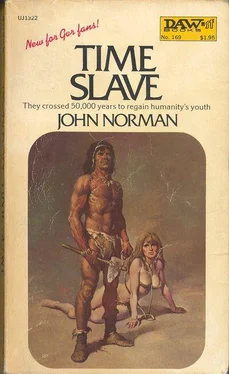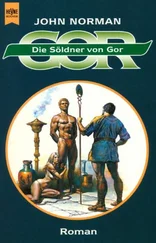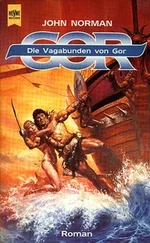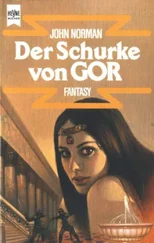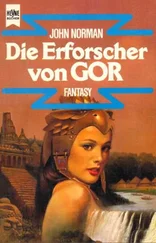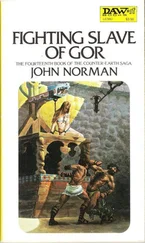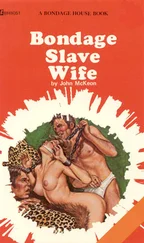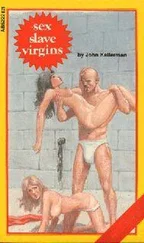“Why did you not leave Spear on the cliffs?” asked Cloud. “Why did you not kill him?”
“Because among the Men,” said Old Woman, “he is first.”
Cloud, nor Antelope, nor the others, had questioned her further..
“Give me meat,” had said the blind, scarred Spear, huge and terrible, at the fire, and it had been done. Spear was again first.
“Spear,” said Old Woman to Hamilton, when they were alone, though Hamilton had not spoken to her, “is a great man. Spear is a wise and great man.”
Hamilton had looked at her.
“The Men,” she said, “need Spear.”
“He killed Drawer,” said Hamilton.
Old Woman nodded. Then she said, “Spear is needed by the men.”
When Spear had again become first, Short Leg had returned to kneel beside him, but he, terrible, one eye torn away, the other blinded, staring out, his face ridged and white with rivers of scarring, with one hand, gestured her from the fire behind which he sat. “I will die,” she had whimpered. Then she cried, “Feel my belly. I carry life!”
“I will not feed you,” said Spear.
Then she cried, “It is your law, that I be fed!”
“I will not feed you,” said Spear.
“I will feed her,” had said Stone. Short Leg had once been Spear’s woman. Since Spear and Stone had been children they had known one another. Stone had been with Spear many years ago, when Spear, for pelts, had purchased Short Leg from the Bear People. In Short Leg’s body was life. Law was to be kept. Stone remembered Spear, from long ago. He remembered Short Leg. She had had flowers in her hair. “I will feed you,” he said, his voice without emotion.
And so Short Leg was fed by Stone, but he did not make her kick, nor use her.
Hamilton’s son was born some months before that of Short Leg. When Hamilton’s son was born Spear had had the infant brought to him. He had lifted it up, over the fire. “A child is born to the Men,” he had said. Then he had given it back to the women. Little attention would be paid to it from that time on by men, except for gentle, loving Tooth, the ugly giant, with the extended canine. When the child could run with the men, when it could throw, when it could kill and take meat, then the men would take it unto themselves, removing it from the children and the women, and by training and counsel, make it wise in lore and skills, make it one of themselves, one of the Men.
But when the child of Short Leg was born, though it was doubtless Spear’s own, he would not take it in his arms, nor lift it in his arms, warming it at the fire, sharing its light against the cold and darkness with the child.
But Stone did this, for the child was not to be cast out. “A child is born to the Men,” said Stone, lifting the child by the fire. Then he handed it to Short Leg. Her son was called Pod by Tooth, and the children.
“Have you seen Cricket?” asked Hamilton of Flower.
“No,” said Flower.
Hamilton gave the berries, except for those she had hidden for Cricket, to Old Woman, and began to look about the camp. “Cricket!” she called. “I have something for you!”
Tree had not been too pleased at what had come between him and his woman, Turtle.
The devotion, the love, which had been fully his, he must now share. It was clear he resented the child, for it came between him and the female.
“It is your son!” had laughed Hamilton.
“I am not a woman,” he had said angrily.
Among the men the mothers were clearly known, and children were spoken of as the sons of the women, or the daughters of the women. Beyond this they might be spoken of as the children, or the young, of the Men. The Men understood the relationship of seed to young, but the possessive concept of a specific, individual paternity, laying a unique claim to a given offspring, was not cultural for them. For the women it was biological. Generally, for the men, such a concept would not become significant until the victory of agriculture, with claims to specific possessions and lands, when inheritance would become crucial. Then, too, of course, with the coming of agriculture, and the need to guarantee specific paternity, because of inheritance rights, accordant cultural provisions would be established. Women would be consigned in impressive ceremonies to individual males. Chastity would become a virtue. Private ownership contracts would become universal. Fear and hatred of sex, and frigidity, and other economic desiderata, conditioned by agricultural priesthoods, would become the hallmarks of the exemplary female. The stirrings of a girl’s glands, for the first time, frightening her, terrifying her, instead of being an occasion for rejoicing, would become evil, and rationally so in the twisted net of economically essential perversions, soon to be invested with all the sanctimonious cant of ignorant pieties. In the trek of civilization, the hunt and the horizon, predictably, for at least a time, must yield to the soil and the hobble. The chains, once climbed upon, if to be lost, must be burned away, melted, in the heat of the stars.
“Look!” had laughed Hamilton, pointing to the tiny birthmark, the small, bluish black treelike stain on the child’s neck, beneath the left ear. It was as though it had been Tree’s own.
“From your seed I have made this child,” said Hamilton, in the language of the Men. “He is my son. He is your son.” It seemed strange to Tree to think of a man as having a son, though doubtless there was a sense in which it might be meaningful to say it.
“Hold him,” smiled Hamilton.
She held out the infant to Tree. Timidly, fearing to drop it, fearing that it might squirm, or cry out, Tree took the infant. He held it in his two hands, and lifted it, looking at it. He looked at the mark under the ear. Then he had held the baby again before his face. He knew that Knife was Spear’s son, though he did not think Knife knew this. Some of the other children he thought he could identify with certain of the men. But with others he was not sure. With this child, however, there seemed no doubt but what it had been his seed that Turtle had tended and nourished.
He looked at Turtle and smiled.
Turtle, radiant, touched him. “I love you, Tree,” she said. “It is your son. You have given me a son.”
Tree looked at the child. He hoped the boy would grow to be a good hunter. He thought perhaps, when the others were not near, he might talk to him, or show him things. He would want him to do well in the Men’s cave. Once, years ago, he had seen Spear teaching Knife. He never told Spear he had seen this. It was an unusual emotion which Tree, briefly, felt for the tiny animal in his arms, so weak, so helpless. “You have given me a son,” said Tree, slowly, thinking about it. He held the tiny thing in his arms. It weighed so little. Its hands were so tiny. He looked at Turtle. Never before had he seen her just as he saw her then. He knew she was beautiful. He knew she was his woman. “I do not think,” he said, “I will ever beat you again.” “Beat me when I deserve it, or you will spoil me,” smiled Hamilton. Tree looked at her. “I will,” he said. “I love you, Tree,” said Hamilton.
Then Fox had ventured by. He saw the child in Tree’s arms. “Tree,” he asked, poking Wolf, who was with him, in the ribs, “do you have a son?” In the language of the Men this joke was rich, for only women had sons and daughters. “When did you leave this son?” asked Fox. “Was it last night,” added Wolf, grinning.
Tree looked angry, and turned red. He thrust the child to Hamilton’s arms.
“A child is born to the Men,” he said.
“We are going hunting,” said Fox.
“I will come with you,” said Tree, quickly.
“Had you not better tend your son?” asked Fox.
Читать дальше
